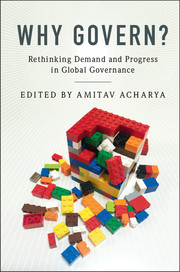Book contents
- Frontmatter
- Contents
- List of Figures
- List of Tables
- Notes on Contributors
- Acknowledgments
- List of Abbreviations
- 1 Rethinking Demand, Purpose and Progress in Global Governance: An Introduction
- Part I The Changing Concept of Global Governance
- Part II Issue Areas
- 5 Conflicts and Security
- 6 Human Rights
- 7 Atrocity Crimes
- 8 Trade
- 9 Finance
- 10 Climate
- 11 Refugees
- 12 Health
- 13 Cyberspace and Social Media
- 14 The Contested Quest for Global Governance: Conclusions and Directions for Further Research
- Bibliography
- Index
9 - Finance
from Part II - Issue Areas
Published online by Cambridge University Press: 05 September 2016
- Frontmatter
- Contents
- List of Figures
- List of Tables
- Notes on Contributors
- Acknowledgments
- List of Abbreviations
- 1 Rethinking Demand, Purpose and Progress in Global Governance: An Introduction
- Part I The Changing Concept of Global Governance
- Part II Issue Areas
- 5 Conflicts and Security
- 6 Human Rights
- 7 Atrocity Crimes
- 8 Trade
- 9 Finance
- 10 Climate
- 11 Refugees
- 12 Health
- 13 Cyberspace and Social Media
- 14 The Contested Quest for Global Governance: Conclusions and Directions for Further Research
- Bibliography
- Index
Summary
This chapter examines the demand for global financial governance in the wake of the massive financial crisis of 2007–9. The global financial meltdown acted as a catalyst for a dramatic boosting of the International Monetary Fund's (IMF) resources and the creation of the Financial Stability Board (FSB), both which took place at the G20 leaders’ second summit in April 2009. These initiatives appeared to signal a heightened demand for global-level institutions in the areas of liquidity provision and financial regulation emerging from the crisis experience. But the limitations of that demand also quickly became clear as these global institutions found themselves working with and alongside strengthened regional, plurilateral and national authorities in complex ways. The result is neither a strengthening nor weakening of the demand for global governance, but rather a change in the content of the demand. A new kind of “cooperative decentralization” in global financial governance is emerging, driven by the preferences of both dominant powers and Southern countries.
The first half of the chapter describes this argument in the case of the IMF. While the IMF's funding boost was dramatic, its significance was immediately called into question by the fact that its new money remained unused in 2008–9 partly because of Southern borrowers’ distrust of the institution. In the end, it was US authorities – not the Fund – that played the most important role in providing international liquidity during this period. Demand for the Fund's resources did, however, grow with the outbreak of the euro crisis, but as a way to supplement European regional arrangements. Lingering distrust of the Fund among Southern officials – reinforced by Northern resistance to governance reform – has encouraged them to strengthen and/or build alternative regional and plurilateral financing arrangements that also work either with or alongside the Fund.
The second half of the chapter explores the FSB's creation. This development turned out to be less significant than it initially appeared because the institution was given very little formal power. This design feature reflected both Northern and Southern concerns about accepting international constraints on their regulatory policymaking. The crisis and post-crisis experience only reinforced their commitments to regulatory sovereignty by increasing the domestic political salience of regulatory issues and their fiscal implications, and by revealing the failures of international cooperation relating to the management of failing institutions.
Information
- Type
- Chapter
- Information
- Why Govern?Rethinking Demand and Progress in Global Governance, pp. 174 - 191Publisher: Cambridge University PressPrint publication year: 2016
Accessibility standard: Unknown
Why this information is here
This section outlines the accessibility features of this content - including support for screen readers, full keyboard navigation and high-contrast display options. This may not be relevant for you.Accessibility Information
- 5
- Cited by
